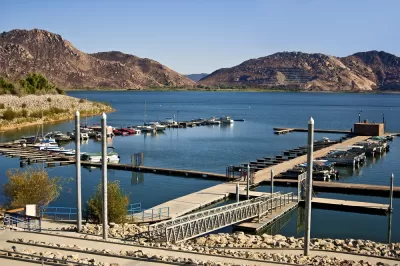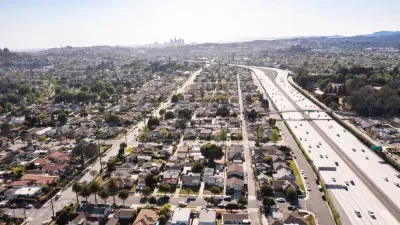It may seem understandable for developers to resort to the ballot box after encountering difficulty with a planning commission or city council, but in California it makes sense even for cities like Moreno Valley that are friendly to new development.

There's a huge payoff for developers to qualify ballot measures so voters can approve their developments without having to go the normal governmental route. It comes in the form of bypassing the expensive and time-consuming environmental review process.
What's more, there's a good chance that after the measure qualifies for the ballot by collecting the appropriate number of valid signatures on their petition, voters may never decide it because the city council has the option of adopting the initiative outright, thus avoiding the expense of what may be a special election.
"The advantage for developers is clear: Projects approved by ballot measures avoid legal challenges under the California Environmental Quality Act (CEQA)," writes Ian Lovett of The New York Times' Los Angeles bureau.
Walmart lays out roadmap to sidestep CEQA
Walmart spearheaded this CEQA bypass approach in their initiative to expand their Sonora store in Tuolumne County, California. Rather than put the measure before the voters, the Sonora City Council adopted it.
The California Supreme Court affirmed Walmart’s strategy in a 2014 decision rejecting a challenge to the [store's] expansion... An elected board, the court ruled, may approve a ballot measure petition without a special election, and that project can then bypass an environmental review.
The court ruling offered “a road map” for how to avoid the environmental review process, said Richard Frank, a former chief deputy attorney general in California who began working on Environmental Quality Act cases shortly after the law was signed in 1970.
Although environmental activists are leaning on state officials to close the loophole, no new legislation has been proposed this year.
Lovett reports from Moreno Valley, California a young city of 193,000 in Riverside County that would seem friendly to new development. It features a "Developer Info" tab on its home page:
Moreno Valley has a Pro-business Philosophy
The City of Moreno Valley is committed to your business’ success and will serve as a partner through every phase of the development process.
But "[a]fter the City Council approved plans to build the largest warehouse complex in the United States, environmental groups sued, contending that the complex would add nearly 70,000 car and truck trips a day to an area that already had some of the most polluted air in the country," writes Lovett. Riverside County also filed suit, as did the South Coast Air Quality Management District.
So backers of the project gathered signatures for a ballot initiative, and then the Council approved it outright — shielding the project from environmental lawsuits.
Jeffrey Giba, one of the councilmen who supported the project, called the environmental lawsuits “an extortion racket.”
“I don’t want to spend my city’s money on a special election when we already approved the project once,” he said.
The fight is not over. The South Coast Air Quality Management District filed a second lawsuit.
Carlsbad citizens fights back
The Moreno Valley World Logistics Center is but one of many examples Lovett cites to illustrate how developers and city councils use the initiative process to bypass CEQA. One notable failure of the process was seen recently in Carlsbad, a wealthy community in northern San Diego County.
Developer Rick J. Caruso had an option to purchase 203 acres near the Agua Hedionda Lagoon. "Under the proposal, nearly 27 acres, or roughly 15%, would have been a shopping and entertainment center, and the remaining 177 acres would have been agriculture, public trails, an outdoor classroom and habitat preservation," wrote Phil Diehl for the Los Angeles Times on March 3.
Carlsbad officials have said Caruso could apply for permits at any time to try to get the project approved through the city's conventional planning process, which requires a review under the California Environmental Quality Act, or CEQA.
The developer had hoped to avoid that process by gathering signatures on a citizens initiative, which was approved by the Carlsbad City Council in August after a city study deemed it met CEQA standards. But opponents launched a referendum that overturned the council's approval.
Measure A was placed on the ballot on February 23 special election. Citizens for North County "spent about $100,000 in the months leading up to the election" opposing the development while "Caruso Affiliated had spent about $10.5 million since May trying to rally public support for the project," writes Diehl.
Opponents won by about four percent. But this referendum and subsequent victory may be the exception to the rule.
Correspondent's note: A 2012 Planetizen post is based on a Lovett piece on CEQA, but this was about one of many unsuccessful attempts to legislatively reform the law that Gov. Jerry Brown called "the Lord's work."
FULL STORY: Builders Pierce California’s Environmental Shield With New Weapon: The Ballot

Study: Maui’s Plan to Convert Vacation Rentals to Long-Term Housing Could Cause Nearly $1 Billion Economic Loss
The plan would reduce visitor accommodation by 25,% resulting in 1,900 jobs lost.

Alabama: Trump Terminates Settlements for Black Communities Harmed By Raw Sewage
Trump deemed the landmark civil rights agreement “illegal DEI and environmental justice policy.”

North Texas Transit Leaders Tout Benefits of TOD for Growing Region
At a summit focused on transit-oriented development, policymakers discussed how North Texas’ expanded light rail system can serve as a tool for economic growth.

San Diego County Sees a Rise in Urban Coyotes
San Diego County experiences a rise in urban coyotes, as sightings become prevalent throughout its urban neighbourhoods and surrounding areas.

Los Angeles County Invests in Wildfire Recovery for Parks, Trails, and Open Space
The $4.25 million RESTORE Program supports the recovery of parks, trails, and open spaces damaged by the January 2025 wildfires through targeted grants that promote community healing, wildfire resilience, and equitable access to nature.

Nevada Bills Aim to Establish Home Insurance Assurance Amidst Wildfire Risk
Republican sponsor hopes the FAIR plan would be “a true market of last resort.”
Urban Design for Planners 1: Software Tools
This six-course series explores essential urban design concepts using open source software and equips planners with the tools they need to participate fully in the urban design process.
Planning for Universal Design
Learn the tools for implementing Universal Design in planning regulations.
Alamo Area Metropolitan Planning Organization
City of Santa Clarita
Institute for Housing and Urban Development Studies (IHS)
City of Grandview
Harvard GSD Executive Education
Toledo-Lucas County Plan Commissions
Salt Lake City
NYU Wagner Graduate School of Public Service



























